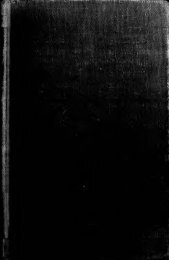Ecclesiastes - GA Barton - 1908.pdf
Ecclesiastes - GA Barton - 1908.pdf
Ecclesiastes - GA Barton - 1908.pdf
Create successful ePaper yourself
Turn your PDF publications into a flip-book with our unique Google optimized e-Paper software.
. dictum<br />
matic_ogrtaintv of the_Stoics.<br />
ECCLESIASTES<br />
When one notes these contrasts, it<br />
in ch. i<br />
isliardly possible longer to maintain that Qoheleth betrays<br />
any Stoic influence. He appears rather as an acute observer of<br />
life, whose bitter experiences have led him to look beneath the sur-<br />
face, and who has thus become conscious of the seemingly futile<br />
repetitions of life, and whose thirst for knowledge of life's mystery<br />
refuses, though baffled, to be satisfied by dogmatism.<br />
Tyler further urges (op. cit., i$ff-) that Qoheleth's oft repeated<br />
"all is vanity" is best explained by Stoic influence, because<br />
Marcus Aurelius declares that " worldly things are but as smoke,<br />
as very nothingness." On any theory of the date of <strong>Ecclesiastes</strong>,<br />
that the stream<br />
however, it might with greater plausibility be urged<br />
of influence, if influence there was, was in the other direction.<br />
The coincidence that both Qoheleth and the Stoics regarded folly<br />
as madness is also to Tyler an argument for his theory. If, how-<br />
ever, his other arguments are invalid, this fact can be regarded as<br />
no more than a coincidence.<br />
Not only do these alleged evidences of Stoic influence appear to<br />
be unreal, but on many other points the positions of Qoheleth and<br />
the Stoics are in such striking contrast as to render the theory of<br />
I<br />
Stoic influence most improbable. The Stoics were materialists,<br />
and most dogmatic in their materialism (Zeller, op. cit., ch. vi),<br />
but there is no trace in <strong>Ecclesiastes</strong> either of their materialism or<br />
their dogmatism. The Stoics regarded God as pure reason, and<br />
were as positive and dogmatic about the divine nature as about<br />
the universe; Qoheleth, on the other hand, regarded both God and<br />
his works as unknowable. God is infinitely above man (cf. 5 2<br />
),<br />
and even what he does man cannot hope to understand (cf. n 8<br />
).<br />
The Stoics thought they understood how the soul was formed in<br />
the unborn child (Zeller, op. cit., pp. 212-213); Qoheleth, on<br />
the other hand, declared that the formation even of the bones<br />
of the unborn infant was a mystery the secret of which is undis-<br />
coverable (ch. 8 17 n 5<br />
). There is a great contrast, too, between<br />
the idea of good as presented by Qoheleth and the Stoics respectively.<br />
To Qoheleth there is no absolute good. A good is a<br />
relative thing; it consists of the satisfaction of the animal appetites<br />
during the period of life when such satisfaction gives enjoyment.





